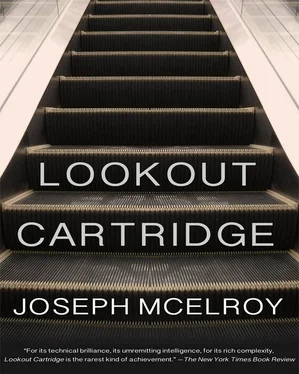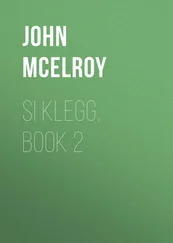Joseph McElroy - Lookout Cartridge
Здесь есть возможность читать онлайн «Joseph McElroy - Lookout Cartridge» весь текст электронной книги совершенно бесплатно (целиком полную версию без сокращений). В некоторых случаях можно слушать аудио, скачать через торрент в формате fb2 и присутствует краткое содержание. Год выпуска: 2014, ISBN: 2014, Издательство: Dzanc Books, Жанр: Современная проза, на английском языке. Описание произведения, (предисловие) а так же отзывы посетителей доступны на портале библиотеки ЛибКат.
- Название:Lookout Cartridge
- Автор:
- Издательство:Dzanc Books
- Жанр:
- Год:2014
- ISBN:9781941088036
- Рейтинг книги:3 / 5. Голосов: 1
-
Избранное:Добавить в избранное
- Отзывы:
-
Ваша оценка:
- 60
- 1
- 2
- 3
- 4
- 5
Lookout Cartridge: краткое содержание, описание и аннотация
Предлагаем к чтению аннотацию, описание, краткое содержание или предисловие (зависит от того, что написал сам автор книги «Lookout Cartridge»). Если вы не нашли необходимую информацию о книге — напишите в комментариях, мы постараемся отыскать её.
Lookout Cartridge — читать онлайн бесплатно полную книгу (весь текст) целиком
Ниже представлен текст книги, разбитый по страницам. Система сохранения места последней прочитанной страницы, позволяет с удобством читать онлайн бесплатно книгу «Lookout Cartridge», без необходимости каждый раз заново искать на чём Вы остановились. Поставьте закладку, и сможете в любой момент перейти на страницу, на которой закончили чтение.
Интервал:
Закладка:
If Krish were found here at the tumulus in the center of the famous Callanish circle that no one ever visited in the northmost of the Outer Hebrides with a crumb of the Great Menhir in his head, the tabloids would make enough noise to alert the very people I might need.
I got him to the east fence. He was surprising. It took all I had to get him up and over. The place had drawn his spirit down. I went over after him and hauled him to a boggy ditch where he was safe unless someone came looking. At least he was spared the sordid mess on his white raincoat. The left pocket held a leather-covered cylinder some six inches long, like a long lighter — and at one end it was a lighter. But when I put my thumb on a button to strike a light to see the wallet in my hand, something shot out of the other end by lucky chance parallel with my upturned sleeve rather than into me, for it was a ten-inch antennalike instrument sharp as an icepick; but the lighter had worked too, so I was able to see that what had sprung the blade was a release near the other end that the heel of my palm had depressed. Using the lighter end you’d take care with the rest of your hand; no doubt Krish didn’t smoke. To retract the blade you pressed the release again. I pocketed the cylinder, first going through the wallet and taking the one thing I didn’t understand, which was numbers on a strip of file card, plus Krish’s money in case a false lead was useful. In an inside pocket of his coat I found a No. 12 Ordnance Survey map with, so far as I could tell in the light of the moon and the lighter, no marks. His ear had been bleeding but there was no cut to be seen.
Back in my room I hung my jeans on a chair and tilted my shoes against the baseboard of the wall. I looked at the numbers on Krish’s file card.
If Cosmo had been capable of “talking” about “others” watching me, and this kind of information evoked from Krish the name Wheeler, what system of accident had brought Jim Wheeler into this far-flung sequence?
I had to know what the destroyers had wished to destroy. Had Krish been thrown off by the strange thought that Jack hadn’t been straight with him? Krish acknowledged that Dagger’s flat had been broken into this second time but said he had not done it. So it had been arranged by him for Jack or by Jack directly. Or indirectly.
The numbers were unspaced: 5758450815½.
My watch still said four. It was ticking. Had I just started it?
It was as if I hadn’t been wakened by Krish’s eyes. I was asleep again, awake again — the pale force of the morning sky spaced itself between the magic concussions of a hand on my door, and there came the murmur of the widow’s voice saying it was nine o’clock, and when I opened my mouth to convert into energy the miles of peat between me and those numbers, and said, Latitude, the voice on the other side said, Yes in fifteen minutes, and I heard her creak lightly down the steep carpeted stairs.
My map open on the bed, the first six digits could be degrees, minutes, and seconds of latitude, a parallel which crossed the northern lowmost slopes of Mount Clisham if I read aright. The other numbers were not longitude, and as I drew my other pair of jeans on I kept looking back at these numbers as if they had a meaning in themselves.
South of Ardvourlie Castle heading down to Harris, I must turn off the road onto this parallel.
A ROUTE TO PAUL’S
What am I hungry for? What if I bought a bog? I might think up a revolutionary way to turn peat into tough elastic to shoe the wheels of a movable railway station. The soundlessness of rubber. Yet the cruel strength of steel like the metal-hard sapodilla wood the Maya whittled into lintel glyphs, not a few of which went up in poor Catherwood’s New York holocaust of 1842.
What did I want to get my hands on? Some ready cash? Not really. The film? It might be sacrificed. But to what? Dagger and I the afternoon of May 26 paused at the foot of an insanely steep lane to look up after the slowly rising back of an old lady in a blue mac hauling her heart up the railing hand over hand. We were there on the south coast because I had to discuss with the boatyard man whose silent partner I was the possibility of my putting in another £500; he was determined to go beyond storing and repairing and into building, and he had two tentative orders, a 24-foot sloop and a 32-foot gaf-rigged ketch, from summer people who had inquired about bypassing a firm they’d heard of through friends who had taken up sailing, and my partner had encouraged them to have a boat made frame by frame right here in this yard.
He inclined toward fiberglass for the hull and he humored his grandfather, a small neat ninety-year-old countryman, who insisted that only wood would do, and when Dagger with great gentleness and good humor told of a friend of his family in Monmouth County, New Jersey, who had invented antipecking specs for chickens so they wouldn’t be able to see each other directly enough to kill each other and these he manufactured by the thousands in plastic — tiny red pince-nez blinkers — the grandfather said that was America and what they did there was their own business. When I said the new ferro-cement hulls gave you as much as 12 percent more space because you did away with framing, Granddad said he could remember when tin pails took over from wooden buckets. He’d worked seven years to learn to be a wheelwright, when you made a wagon wheel in those days you didn’t have nothing but your eye and your hands to go by, seven years wouldn’t teach you all you must know, say, about elm and ash and a bone-hard butt of beech eight feet long six inches square for an axle but nothing would do for spokes but oak, for spokes must never be sawn lest you get a cross-grain, and a cross-grained spoke could snap, so you had to have a wood that could be cleft, and the wood was oak — and not just for spokes — you used nothing but heart of oak for the old harrows — a hundred years ago wheelwright shops made harrows and the finished harrow was fitted with a copse; now a copse was a wrought-iron loop let into the wood so you could harness your horse, and the copse was hooked in with a bolt (once made of wood, then of iron) called a whippance. Oh yes, but there was a lot to a wheel, you could cast the felloes out of ash or beech or elm as well as oak. And Grandfather (whose south-country speech despite the rolling father’s was not so different from my late grandfather’s narrow dry Maine accent) bet we didn’t know what part of the wheel the felloes were.
But he was interrupted by his grandson, and Dagger walked off down to the beach with the old man, while I finished my business with my partner whom I so rarely saw.
And next day when Dagger and I were on our way up to Bristol and Wales, Dagger recounted what the old man had told him about the parallel grain of the oak that made it ideal for spokes, and how it had to be cleft in the summer still full of sap so the split would run from end to end. The old man had changed jobs around the turn of the century and had gone to work in a coach-and-foundry shop where he’d done all right. Dagger said the old man had never himself made harrows, for by the time he got into the trade harrows and ploughs were being made of cast iron, though wagon and cart wheels were still made largely of wood.
At Clifton near Bristol we parked in the gorge far below the marvelous bridge and Dagger consented to take some quick cut-in shots of the high limestone cliffs and the Giant’s Cave and the woods and the river cutting through to Bristol Channel, and above all Brunel’s bridge — with the 15, then rotating to the 25, then to the 50—from crag to crag across the sky famous as a spectacle and known to students of Brunel for his original drawings which are art in their own right. And as if I were sound-tracking what the Beaulieu filmed, I told Dagger how despite numerous flaws in Brunel’s calculations the bridge had beautifully survived, and he murmured getting his viewfinder-focus right how easy it would be to blow it up. I enumerated what in that case would be found under the first foundation stones — a plaque, some coins, a China plate bearing a picture of the bridge, and a copy of the Act of Parliament enabling its construction. The Egyptian towers Brunel had first designed were never built and because his sketches for them were lost we know of his projected tower-base plaque designs (for instance, men carrying one of the links of the chainwork) only through a friend’s memoirs.
Читать дальшеИнтервал:
Закладка:
Похожие книги на «Lookout Cartridge»
Представляем Вашему вниманию похожие книги на «Lookout Cartridge» списком для выбора. Мы отобрали схожую по названию и смыслу литературу в надежде предоставить читателям больше вариантов отыскать новые, интересные, ещё непрочитанные произведения.
Обсуждение, отзывы о книге «Lookout Cartridge» и просто собственные мнения читателей. Оставьте ваши комментарии, напишите, что Вы думаете о произведении, его смысле или главных героях. Укажите что конкретно понравилось, а что нет, и почему Вы так считаете.












